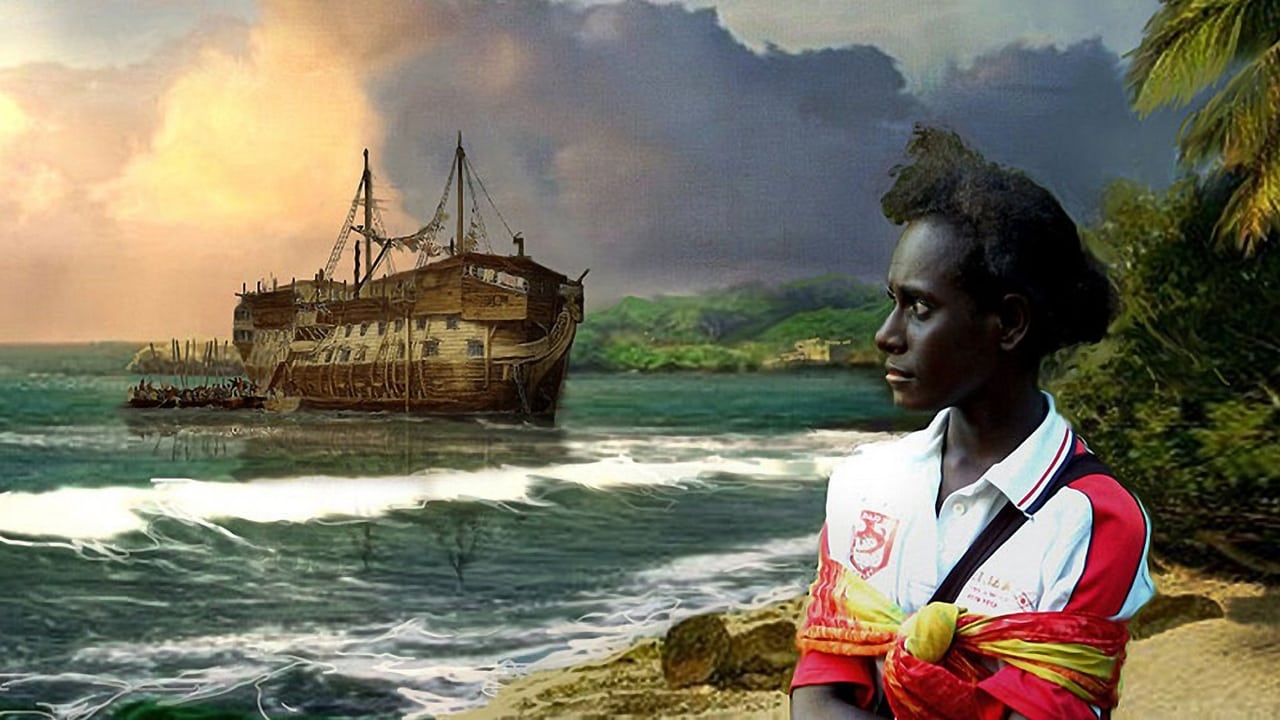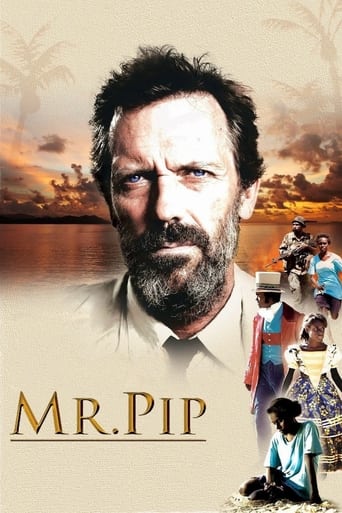SpecialsTarget
Disturbing yet enthralling
Aedonerre
I gave this film a 9 out of 10, because it was exactly what I expected it to be.
Roy Hart
If you're interested in the topic at hand, you should just watch it and judge yourself because the reviews have gone very biased by people that didn't even watch it and just hate (or love) the creator. I liked it, it was well written, narrated, and directed and it was about a topic that interests me.
Mandeep Tyson
The acting in this movie is really good.
ReganRebecca
It's truly amazing, but writer/director Andrew Adamson takes so many interesting elements that could have potentially made a great story and flattens them out so they are dull and boring. Perhaps this is the fault of the novel, I don't know having never read it, but on it's own Mr. Pip stands as a mediocre piece of art which is quite sad as it has an explosive backdrop and some quite lovely things to say. Matilda Naimo (newcomer Xzannjah Matsi) lives on the island of Bougainville in the early 90s, during a vicious struggle for independence. Most of the men, including Matilda's father have fled overseas along with all the white population, with the exception of one white man, known familiarly as Popeye to the locals, who remains to take care of his wife, a native Bougainvillean named Grace. A blockade is imposed to starve out the rebels meaning their are no teachers and fewer resources. Despite not being a teacher, Popeye (real name Mr. Watts), decides to educate the local children, mostly by reading to them from Great Expectations. His eye is quickly caught by Matilda who is a whiz at math (something brought up once and then abruptly dropped), and she warms to him because she immediately strongly connects with the story of Great Expectations and the protagonist Pip. A lot of the movie has to do with the power of literature and how strongly it can connect with people and help them through life. There are some nice scenes that show Matilda's point of view where she imagines Great Expectations but because she lives on a tropical island, the places and customs she imagines are much closer to her culture that Victorian England (a technique done to even greater effect in Tarsem Singh's The Fall). Another thing is that a huge part of the conflict is Grace's mother Dolores being incredibly suspicious of both Mr. Watts and the novel Great Expectations. Her point of view was barely represented though, so when she makes a decision involving the novel which endangers the lives of the whole village it makes no sense and is not understandable to the audience. Furthermore even Mr. Watts who becomes a mentor to Matilda is sort of obscured in mystery. This turns out to be on purpose for this a late ending reveal but it comes so late and feels so random that I couldn't bring myself to care. A half-baked feature.
Violet Weed
I tried to like this movie, I really did. But it was just to implausible. There's no way anyone in what is a VERY backward polynesian society would grok Great Expectations, certainly not a group of young children. Hey! I worked a project in that area of the world and another thing you do not see is the one common thing to that entire area..... FLIES. ENDLESS FLIES. NEVERENDING FLIES. In fact I worked as an analyst on a mining project there, so I DO know what I'm talking about. The one thing they got right.... how brutes (rebels or 'formal military' men) act during 'war' or 'insurrection'. Shooting the man then cutting up his body and throwing it to the pings, then raping the woman and doing the same thing to HER body. THAT was TRUTH, in any third-world (really 'fourth-world') society when 'war' occurs. (I put war in quotes because it really doesn't take much in those parts of the world to cause people to commit horrific acts against their brethren.) Then the ending of the movie, how trite! Of course Mr. Pip left his wife, a civilized white woman, for a jetblack third-world slut. Yeah, that rings true! HAH! I don't usually enjoy anything that Brit actor, Hugh whatisface is in, because he really doesn't seem to have either a good agent or perhaps he's just capable of discerning what's good art and what is not. Anyway he's just a parrot like 99% of the rest of the movie/TV actors/actresses. (Yes, call me a troll, but I used to write for Hollywood and I've never really gotten over the embarrassment of that stupidity.)
secondtake
Mr. Pip (2012)Wow, did I want to like this movie. It was different at the outset and it had a great leading man, the lead from the t.v. show "House," Hugh Laurie. It was set in Papua New Guinea where a village of locals was terrorized by an outside military group. The white man in the midst of these very dark-skinned natives is part of the outer conflict by his difference, but really Lauries plays an insider, too, and hence some of the interest.On top of this is the cool plot idea, which eventually becomes a contrivance, based on the Dickens novel "Great Expectations." In fact, the leading character of that book, Pip, becomes an unwitting character here. It's subtle and often touching and sometimes brilliant.But it's also uneven, and preys upon the audience for sympathy, which is a deal- breaker for me. There are times when the movie is unsually brutal, and though I don't doubt the brutality of militias in the fringes of the world, it doesn't make a movie, at least not as a centerpiece.It's true, the plot continues—it moves from continent to continent, and the leading character (not Laurie) is now a young girl from the tribe on this island who befriended her white tutor. And it's always interesting, though a bit forced. There are times when the conflicts are about conflict. And there are tender, intimate insights into cross-cultural issues. And not only the English white world versus the tribal world of New Guinea, but also the traditional culture vs. the new Western-influenced world that was so often militarized and corrupt.I think some people will be blown away by all of this. I'm looking at it with a bit of a distance, thinking of it as a movie, regardless of its emotional impact. And it really is a bit sloppy and indulgent. But give it a shot. It's different, and that's a winning trump card.
tegantiu
The film centres on a young girl, Matilda, who lives with her mom in a Bougainville village in Papua New Guinea. During a time of civil war, all the whites of the village have left, with one, Mr Watts, remaining on the island with his native wife. Mr Watts is brought to the local school in an attempt to teach the children of the village. It is here that the children are introduced to 'Great Expectations' by Charles Dickens, and find a friend in the central character, Pip. Filmed on location in Papua New Guinea, the director has accurately captured village life throughout the film with colourful scenes and beautiful cinematography, as well as a script that reflects characteristics of New Guinean language and humour. Xzannjah Matsi and Healesville Joel do a wonderful job in bringing their characters of Matilda and Dolores to life with great conviction. Hugh Laurie also does a good job portraying the slightly sad and slightly mysterious Mr Watts who lives on the island with his Bougainvillean wife Grace. Set during a dark time in Papua New Guinean history, some scenes might disturb some viewers, however the violence that is present in the story is approached tactfully in which it is suggestive and the viewer is spared too many visual details.Overall, Mr Pip is an exceptional film which brings justice to the original novel. Stunningly filmed, well written, entertaining and endearing, Mr Pip is a truly memorable film and great achievement in Australasian cinema.

